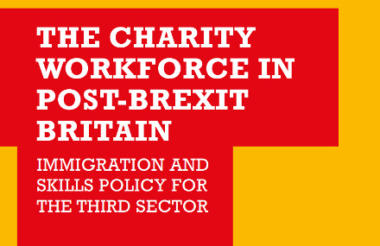Over 80 per cent of EU nationals currently working in the charity sector would be ineligible to work in the UK, if the same rules that apply to non-EU nationals were applied to them, which would have a “dramatic impact”, researchers said.
The findings were made in a report from the Institute of Public Policy which was commissioned by Charity Finance Group and published yesterday.
The report The charity workforce in post-Brexit Britain: Immigration and skills policy for the third sector found that, if the same skills rules that applied to non-EU nationals were applied to EU nationals, 82 per cent of EU nationals would be ineligible to work in the UK. This increases to 87 per cent in social and residential care job roles.
Speaking at the launch of the report at the All Party Parliamentary Group, report author Marley Morris, senior research fellow at IPPR, said: “If you apply the model for skills on non-EU workers, it would mean quite simply a dramatic impact on the EU charity workers in the UK.”
The report also found that charities will face a skills shortage if they are unable to access workers from the European Union, as the number of EU nationals working in UK charities has more than doubled since 2000 from 14,000 to 31,000 – around 4 per cent of the current charity workforce.
The report also noted that a large majority of EU workers in the charity sector are from the “old member states”, mainly countries in Western Europe. It said: “Approximately 72 per cent of EU workers in the charity sector are nationals of the EU14 member states – the pre-2004 accession countries – compared to 42 per cent of EU nationals in the UK workforce as a whole. “
It said that EU workers tend to be higher paid and more highly qualified than their UK and non-EU counterparts, and are largely concentrated in social work, residential care, education and membership organisations, tending to be younger and more highly qualified than UK workers.
The report also found that charities also need help in getting to grips with the new system, as “62 per cent of respondents had no experience of the recruiting system for non-EU nationals”. And that the charity sector is also ill-prepared to train up UK workers due to lack of funds.
It found that more than half of charities say that they would have committed to more training in the past year – with two thirds of those respondents saying that funding was a key barrier.
Recommendations
The report recommended a swift guarantee of free movement rights for current EU nationals, and a light-touch system for providing documentation.
It also recommended the creation of a “quasi-alignment with free movement of people” system with the EU, which would enable people to continue to come to the UK but giving the UK the right to introduce controls when needed and support local workers.
It also called for greater flexibility of the Apprenticeship Levy, if it stays, so that charities can give any unspent levy funds to other charities and therefore keep investment in the sector.
The voice of charities has not been loud enough
Speaking at the APPG, Andrew O’Brien, director of policy and engagement at CFG, said that charities voices have not been heard during the Brexit debate, “partly because the government hasn’t been listening, and also because our voice hasn’t been loud enough as a sector when it comes to making our views clear”.
He said that the minimum the CFG wants to see is a “Brexit in which it is no harder for charities to do their jobs than before Brexit, and the work around getting the immigration system right will be critical to that”.
O’Brien said that there is a danger of seeing “a lot of time spent on how we are going to leave the European Union, rather than what we are actually going to be doing when we do leave the European Union”.
But charities also want the government to “think about where they can use Brexit to improve the operating environment for charities”. He said: “I don’t think that is a remain or a leave position, ultimately if you believe that staying in the EU was the right thing to do, you need to make the most of the opportunity to negate the negative effects of leaving the EU.
“And if you are a leaver, you want to reap the benefits of Brexit because that was the purpose in leaving in the first place. So I don’t think it is a controversial statement to say that we want to have some articulation with government about what it is going to be using Brexit for.”
Related articles











